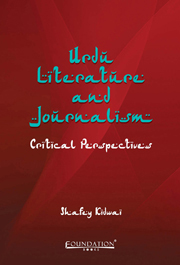Book contents
- Frontmatter
- Dedication
- Contents
- Preface
- Introduction
- Acknowledgements
- 1 Post-Independence Urdu Short Story
- 2 Post-Partition Urdu Poetry
- 3 Structuralism and Post-structuralism in Urdu Criticism
- 4 Jayant Parmar
- 5 Firaq as a Critic
- 6 Ghalib Criticism
- 7 Literature, Culture and Social Consciousness
- 8 The Influence of Tagore on Urdu Literature
- 9 Early Journalistic Endeavours of Sir Syed Ahmad Khan
- 10 Pioneering the First Urdu Book on Journalism
- 11 The Contribution of Urdu Journalists to the First War of Independence
- 12 Abul Kalam Azad's Journalistic Conquests
- Index
7 - Literature, Culture and Social Consciousness
An Appraisal of Faiz's Prose Writings
Published online by Cambridge University Press: 05 October 2014
- Frontmatter
- Dedication
- Contents
- Preface
- Introduction
- Acknowledgements
- 1 Post-Independence Urdu Short Story
- 2 Post-Partition Urdu Poetry
- 3 Structuralism and Post-structuralism in Urdu Criticism
- 4 Jayant Parmar
- 5 Firaq as a Critic
- 6 Ghalib Criticism
- 7 Literature, Culture and Social Consciousness
- 8 The Influence of Tagore on Urdu Literature
- 9 Early Journalistic Endeavours of Sir Syed Ahmad Khan
- 10 Pioneering the First Urdu Book on Journalism
- 11 The Contribution of Urdu Journalists to the First War of Independence
- 12 Abul Kalam Azad's Journalistic Conquests
- Index
Summary
Much light has been shed on the poetic dexterity and awe-inspiring aesthetic sensibility of Faiz (1911–1984) but his literary, cultural, aesthetic, artistic and social concerns, lucidly exposed to view in his prose writings, both in Urdu and English, have hardly been focussed on. Sheema Majeed's compilation of his Culture and Identity, Selected English Writings of Faiz (2005) and a few pieces on his Urdu prose (see also ‘Faiz Ek Naser Nigar: Afkar Fair Number’ by Saher Ansari, ‘Faiz Ke Tanqueedi Ravaiyye’ by Ali Ahmad Fatmil, ‘Faiz Ahmad Faiz Bahaisiyat Naqqad’ by Shafeeq Ahmad Ashrafi.) aside, seldom does one come across any discernable attempt to sift through the whole corpus of his prose writings, available in the form of a number of articles, reviews, laconic essays, prefaces, blurbs or short introductions to books, reviews, letters, speeches, discussions, radio talks, TV discussions, lectures and presidential remarks. These writings unfailingly prove that Faiz was certainly more than an aesthete who takes delight in conveying impressions in a florid style that a piece of art may evoke.
Most of his prose pieces are expository, evidently propelled along by the progressive canons of literature and many of them seem to have a pertinent point in them. The ideas get life in Faiz's tautly written prose and these pieces, embedded with fresh critical insights, establish his credentials as a sensitive critic. At times, his articles seem to make him a literary enthusiast whose writings are certainly more than the mere elucidation of pre-existent meaning.
- Type
- Chapter
- Information
- Urdu Literature and JournalismCritical Perspectives, pp. 105 - 114Publisher: Foundation BooksPrint publication year: 2014

